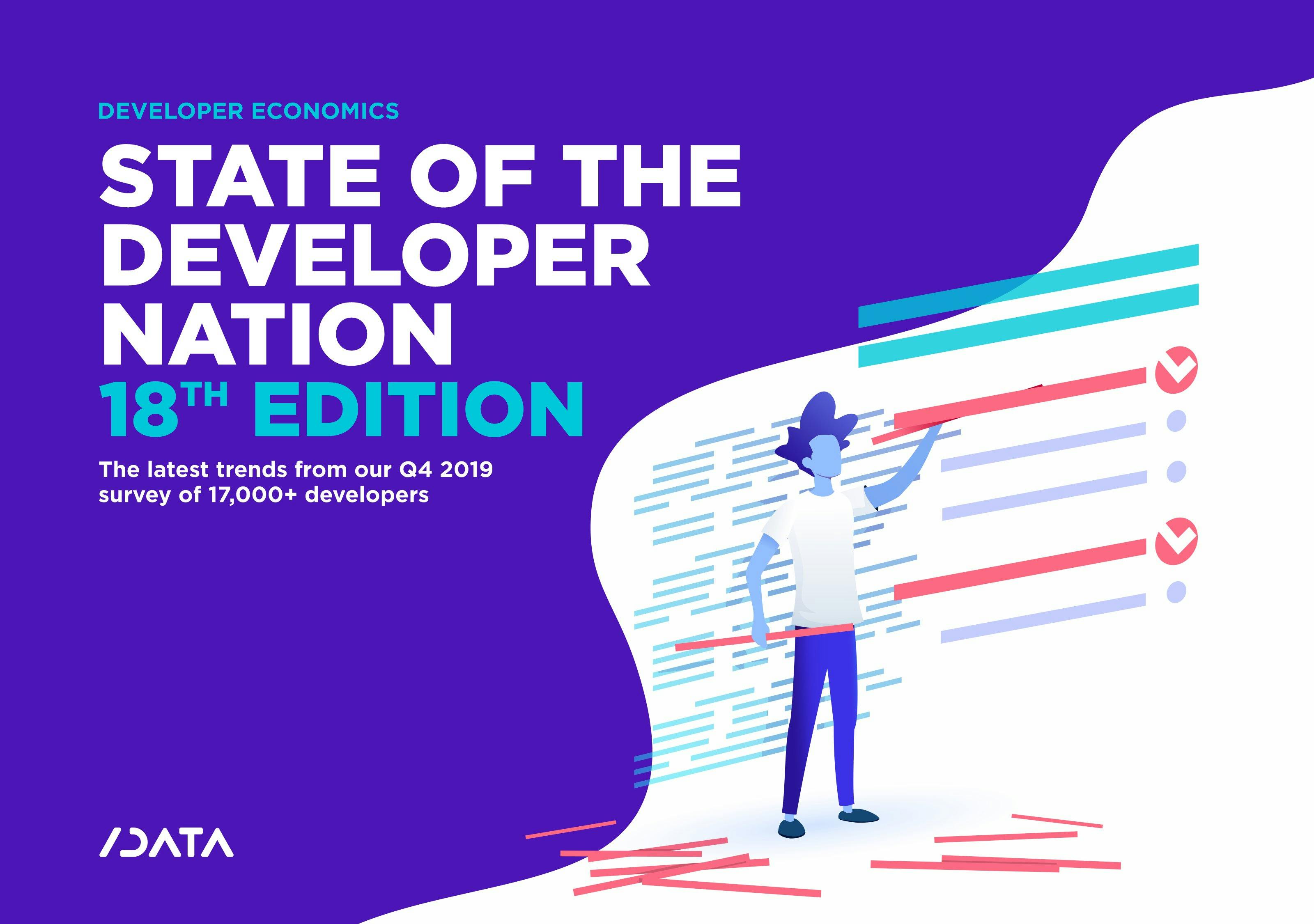
April 14, 2020
State of the Developer Nation 18th Edition - Q4 2019
/Data Developer Economics is the leading research programme on mobile, desktop, industrial IoT, consumer electronics, 3rd party ecosystems, cloud, web, game, AR/VR and machine learning developers as well as data scientists, tracking the developer experience across platforms, revenues, apps, languages, tools, APIs, segments and regions.
The 18th Developer Economics global survey wave ran from November 2019 to February 2020 and reached more than 17,000 developers in 159 countries. This research report delves into key developer trends for H1 2020 and beyond.
The report focuses on six major themes - each with its own visualisations, showing how the data lends insight into the developer community.
1. Programming language communities - An update: Programming languages are often the kernels of strong communities and the subject of opinionated debate. In this chapter we provide updated estimates of the number of active software developers using each of the major programming languages, across the globe and across all kinds of programmers.
2. Contributing to open-source software:
Open-source software is ubiquitous in the developer world, but not every developer is also an open-source contributor. In this chapter we explore who the contributors to open-source software are, their reasons for contributing, and finally what open-source support they expect from companies.
3. DevOps Participants and Adoption: DevOps has transformed the way that software is built. But, not all developers and organisations have made the cultural shift. In this chapter we look at how many developers are using CI/CD tools, the technology at centre of the DevOps process. The analysis also looks at which developers are using these tools, their experience, workplace and background.
4. Where do machine learning developers run their code?: For some data scientists and machine learning developers, it's not just about pure model development anymore. Indeed, the emphasis has shifted to real-world production scenarios that are concerned with issues such as inference performance, scaling, load balancing and so on. These require computation power, which in the past has been a huge hindrance for machine learning developers. In this chapter, we explore where machine learning developers run their app or project's code, and how it differs based on how they are involved in machine learning/AI, what they're using it for, as well as which algorithms and frameworks they're using.
5. Augmented & Virtual reality: Augmented Reality (AR) and Virtual Reality (VR) are two development areas which have surged in popularity in recent years as the technology has matured and more devices support AR and VR capabilities. In this chapter we explore the profile of AR and VR developers and non- developers, focusing on their involvement in other sectors, their technology and device choices and what they are building.
6. Emerging technologies: We have been tracking the adoption and engagement of emerging technologies for two years. In this chapter, we discuss which technologies have increased and decreased in popularity over the previous twelve months.
We hope you'll enjoy this report and find the insights useful! If you have any questions or comments, or are looking for additional data, you can get in touch with Miljana Mitic, Digital Marketing Executive for SlashData at marketing@slashdata.co.
Methodology
Developer Economics 18th edition reached 17,000+ respondents from 159 countries around the world. As such, the Developer Economics series continues to be the most global independent research on mobile, desktop, industrial IoT, consumer electronics, 3rd party ecosystems, cloud, web, game, AR/VR and machine learning developers and data scientists combined ever conducted. The report is based on a large-scale online developer survey designed, produced and carried out by SlashData over a period of twelve weeks between November 2019 and February 2020.
Respondents to the online survey came from 159 countries, including major app and machine learning development hotspots such as the US, China, India, Israel, UK and Russia and stretching all the way to Kenya, Brazil and Jordan. The geographic reach of this survey is truly reflective of the global scale of the developer economy. The online survey was translated into eight languages in addition to English (simplified Chinese, traditional Chinese, Spanish, Portuguese, Vietnamese, Russian, Japanese, Korean) and promoted by more than 70 leading community and media partners within the software development industry.
To eliminate the effect of regional sampling biases, we weighted the regional distribution
across eight regions by a factor that was determined by the regional distribution and growth trends identified in our Developer Economy research. Each of the separate branches: mobile, desktop, industrial IoT, consumer electronics, 3rd party ecosystems, cloud, web, games, augmented and virtual reality, and data science and machine learning were weighted independently and then combined.
To minimise other important sampling biases across our outreach channels, we weighted the responses to derive a representative distribution for technologies used, and developer segments. Using ensemble modelling methods, we derived a weighted distribution based on data from independent, representative channels, excluding the channels of our research partners to eliminate sampling bias due to respondents recruited via these channels. Again, this was performed separately for each of mobile, industrial IoT, consumer electronics, 3rd party ecosystems, desktop, cloud, web, games, augmented and virtual reality, and data science and machine learning.
For more information on our methodology please visit https://www.slashdata.co/methodology.
Contact us
Swan Buildings (1st floor)20 Swan StreetManchester, M4 5JW+441612400603community@developernation.net